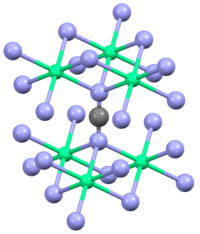Calcium cyanamide
 | |
 | |
| Names | |
|---|---|
| IUPAC name
Calcium cyanamide | |
| Other names
Cyanamide calcium salt, Lime Nitrogen, UN 1403, Nitrolime | |
| Identifiers | |
| 3D model (JSmol) |
|
| ChemSpider | |
| ECHA InfoCard | 100.005.330 |
| EC Number | 205-861-8 |
| PubChem CID |
|
| RTECS number | GS6000000 |
| UNII | |
| UN number | 1403 |
| |
| |
| Properties | |
| CaCN2 | |
| Molar mass | 80.102 g/mol |
| Appearance | White solid (Often gray or black from impurities) |
| Odor | odorless |
| Density | 2.29 g/cm3 |
| Melting point | 1,340 °C (2,440 °F; 1,610 K)[1] |
| Boiling point | 1,150 to 1,200 °C (2,100 to 2,190 °F; 1,420 to 1,470 K) (sublimes) |
| Reacts | |
| Hazards | |
| Safety data sheet | ICSC 1639 |
| EU classification (DSD) (outdated) |
Harmful (Xn) Irritant (Xi) |
| R-phrases (outdated) | R22 R37 R41 |
| S-phrases (outdated) | (S2) S22 S26 S36/37/39 |
| NFPA 704 | |
| Flash point | Non-flammable |
| US health exposure limits (NIOSH): | |
| PEL (Permissible) |
none[2] |
| REL (Recommended) |
TWA 0.5 mg/m3 |
| IDLH (Immediate danger) |
N.D.[2] |
| Related compounds | |
| Related compounds |
Cyanamide Calcium carbide |
| Except where otherwise noted, data are given for materials in their standard state (at 25 °C [77 °F], 100 kPa). | |
| | |
| Infobox references | |
Calcium cyanamide is the inorganic compound with the formula CaCN2. This calcium derivative of cyanamide (CN22−) is used as fertilizer,[3] first synthesized in 1898 by Adolph Frank and Nikodem Caro (Frank-Caro process).[4] It is commercially known as nitrolime.
Production
Calcium cyanamide is prepared from calcium carbide. The carbide powder is heated at about 1,000 °C in an electric furnace into which nitrogen is passed for several hours.[5] The product is cooled to ambient temperatures and any unreacted carbide is leached out cautiously with water.
- CaC2 + N2 → CaCN2 + C (ΔHƒ°= –69.0 kcal/mol at 25 °C)
The reaction is conducted in large steel chambers. An electric carbon element heats the reactants to red heat. Nitrogen gas is pressurised at 2 atmospheres.
It crystallizes in hexagonal crystal system with space group R3m and lattice constants a = 3.67, c = 14.85 (.10−1 nm).[6][7]
Uses

The main use of calcium cyanamide is in agriculture as a fertilizer.[3] In contact with water it decomposes and liberates ammonia:
- CaCN2 + 3 H2O → 2 NH3 + CaCO3
It was used to produce sodium cyanide by fusing with sodium carbonate:
- CaCN2 + Na2CO3 + 2C → 2 NaCN + CaO + 2CO
Sodium cyanide is used in cyanide process in gold mining. It can also be used in the preparation of calcium cyanide and melamine.
Through hydrolysis, calcium cyanamide produces cyanamide:
- CaCN2 + H2O + CO2 → CaCO3 + H2NCN
The conversion is conducted on slurries, consequently most commercial cyanamide is sold as an aqueous solution.
Thiourea can be produced by the reaction of hydrogen sulfide with calcium cyanamide in the presence of carbon dioxide.[8]
Calcium cyanamide is also used as a wire-fed alloy in steelmaking, in order to introduce nitrogen into the steel.
Safety
The substance can cause alcohol intolerance, before or after the consumption of alcohol.[9]
See also
References
- ↑ Pradyot Patnaik. Handbook of Inorganic Chemicals. McGraw-Hill, 2002, ISBN 0-07-049439-8
- 1 2 "NIOSH Pocket Guide to Chemical Hazards #0091". National Institute for Occupational Safety and Health (NIOSH).
- 1 2 Auchmoody, L.R.; Wendel, G.W. (1973). "Effect of calcium cyanamide on growth and nutrition of plan fed yellow-poplar seedlings". U.S. Department of Agriculture, Forest Service. Retrieved 2008-07-18.
- ↑ "History of Degussa: Rich harvest, healthy environment". Retrieved 2008-07-18.
- ↑ Thomas Güthner; Bernd Mertschenk (2006). "Cyanamides". Ullmann's Encyclopedia of Industrial Chemistry. Weinheim: Wiley-VCH. doi:10.1002/14356007.a08_139.pub2.
- ↑ F. Brezina, J. Mollin, R. Pastorek, Z. Sindelar. Chemicke tabulky anorganickych sloucenin (Chemical tables of inorganic compounds). SNTL, 1986.
- ↑ Vannerberg, N.G. "The crystal structure of calcium cyanamide" Acta Chemica Scandinavica (1-27,1973-42,1988) (1962) 16, p2263-p2266
- ↑ Mertschenk, Bernd; Beck, Ferdinand; Bauer, Wolfgang (2000). "Thiourea and Thiourea Derivatives". doi:10.1002/14356007.a26_803.
- ↑ Potential risks to human health and the environment from the use of calcium cyanamide as fertiliser, Scientific Committee on Health and Environmental Risks, PDF, 1,534 Kb, March 2016, Retrieved 22 July 2017
External links
- "NIOSH Pocket Guide to Chemical Hazards #0091". National Institute for Occupational Safety and Health (NIOSH).
- History of calcium cyanamide (Archived)
- Bioassay of Calcium Cyanamide for Possible Carcinogenicity (CAS No. 156-62-7)
- Entry at Classical Encyclopedia
